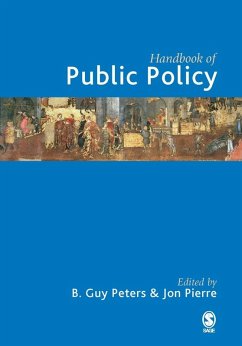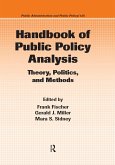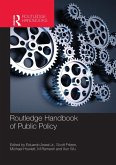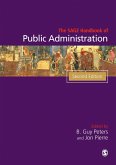'The new handbook by Peters and Pierre provides an invaluable addition to the literature. It offers new scholars and practitioners a means to navigate many of the complex theoretical and practical issues in contemporary policy analysis' - Mark Considine, University of Melbourne
The public policies of governments affect the lives and livelihoods of citizens every day in every country around the world. This handbook provides a comprehensive review and guide to the study, theory and practice of public policy today.
Section One, Making Policy, introduces the policy making process - the means by which public policies are formulated, adopted and implemented - and serves to review the many competing conceptualizations within the field.
Section Two, Substantive Policy Areas, focuses on a number of substantive policy areas to consider both diversity and commonalties across different sectoral policy areas.
Section Three, Evaluating Public Policy, addresses issues of policy analysis more directly and assesses successes and failures in public policy in an attempt to answer the question 'what is good policy?'.
The concluding chapter considers the different disciplinary contributions to the research and study of public policy both retrospectively and prospectively.
Drawing contributions from leading academics and policy analysts from around the world, the handbook illustrates the changing role of governments vis-à-vis the public and private sector and the different policy actors (national and international, governmental and non-governmental) involved in the policy making process.
It will be an essential companion for all advanced undergraduates, graduates, academics and practitioners across public policy and public administration, public management, government and political science.
The public policies of governments affect the lives and livelihoods of citizens every day in every country around the world. This handbook provides a comprehensive review and guide to the study, theory and practice of public policy today.
Section One, Making Policy, introduces the policy making process - the means by which public policies are formulated, adopted and implemented - and serves to review the many competing conceptualizations within the field.
Section Two, Substantive Policy Areas, focuses on a number of substantive policy areas to consider both diversity and commonalties across different sectoral policy areas.
Section Three, Evaluating Public Policy, addresses issues of policy analysis more directly and assesses successes and failures in public policy in an attempt to answer the question 'what is good policy?'.
The concluding chapter considers the different disciplinary contributions to the research and study of public policy both retrospectively and prospectively.
Drawing contributions from leading academics and policy analysts from around the world, the handbook illustrates the changing role of governments vis-à-vis the public and private sector and the different policy actors (national and international, governmental and non-governmental) involved in the policy making process.
It will be an essential companion for all advanced undergraduates, graduates, academics and practitioners across public policy and public administration, public management, government and political science.
Dieser Download kann aus rechtlichen Gründen nur mit Rechnungsadresse in A, D ausgeliefert werden.









